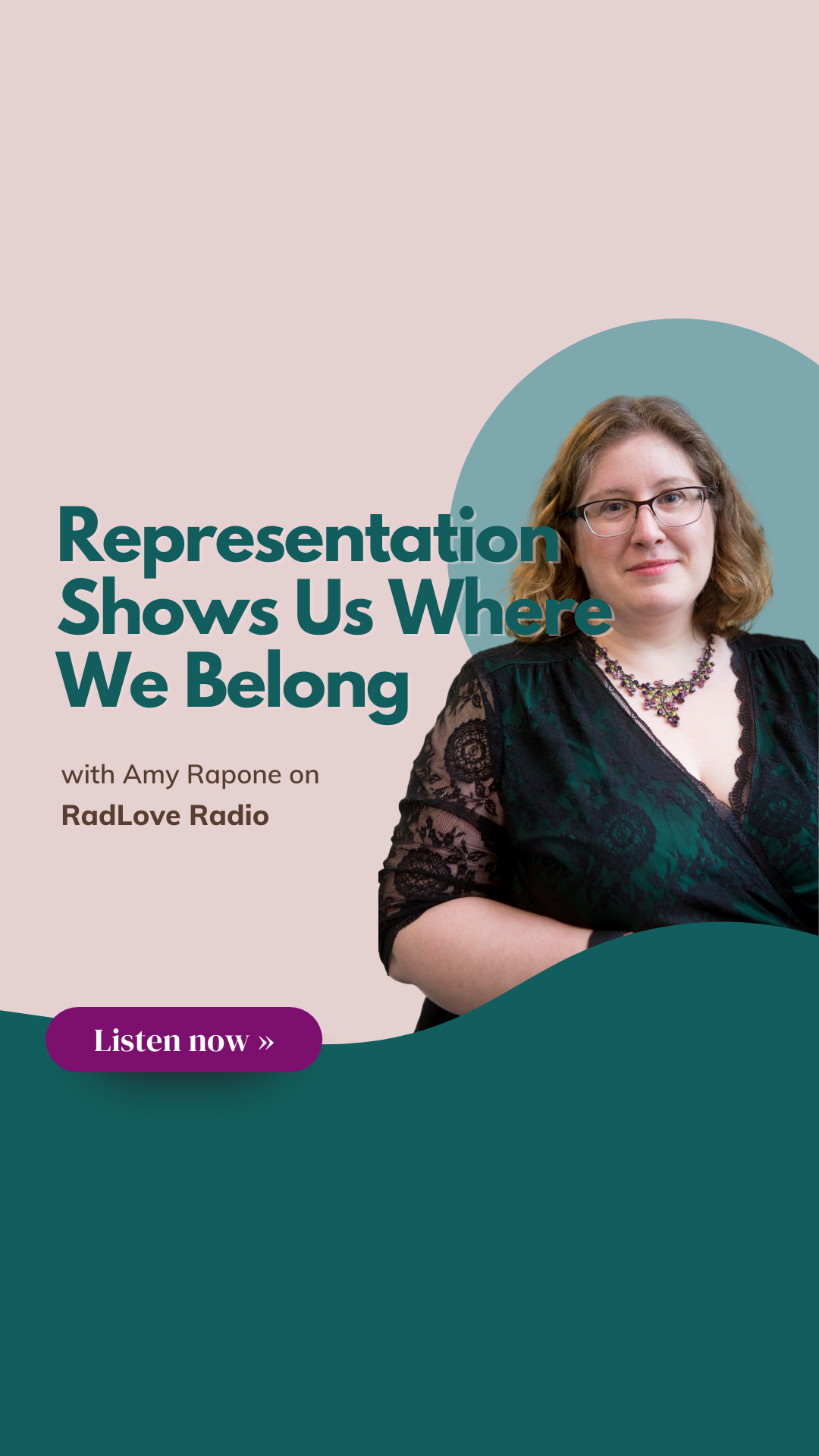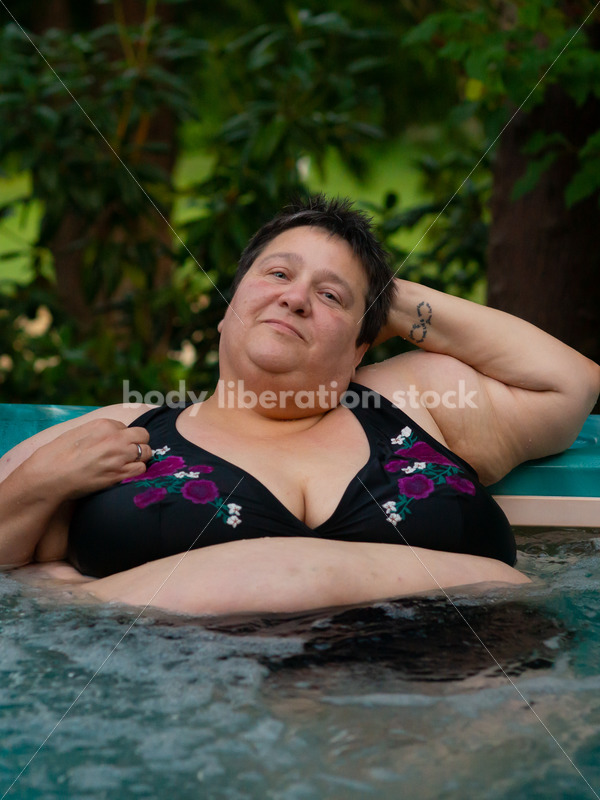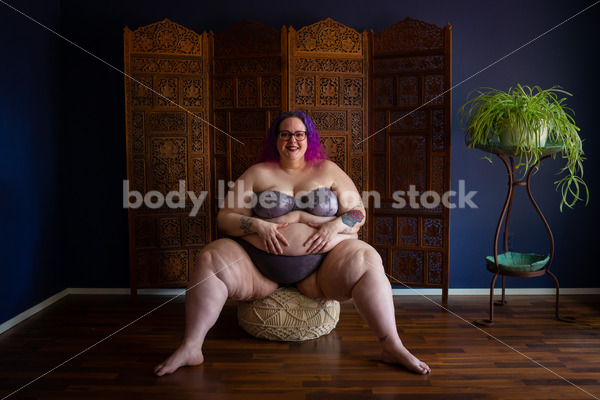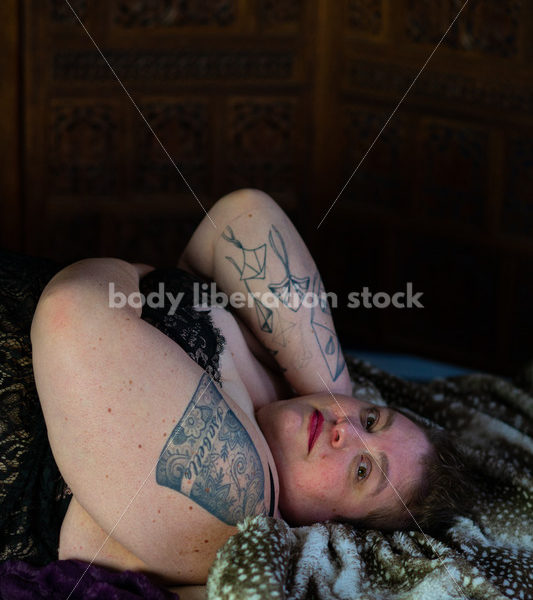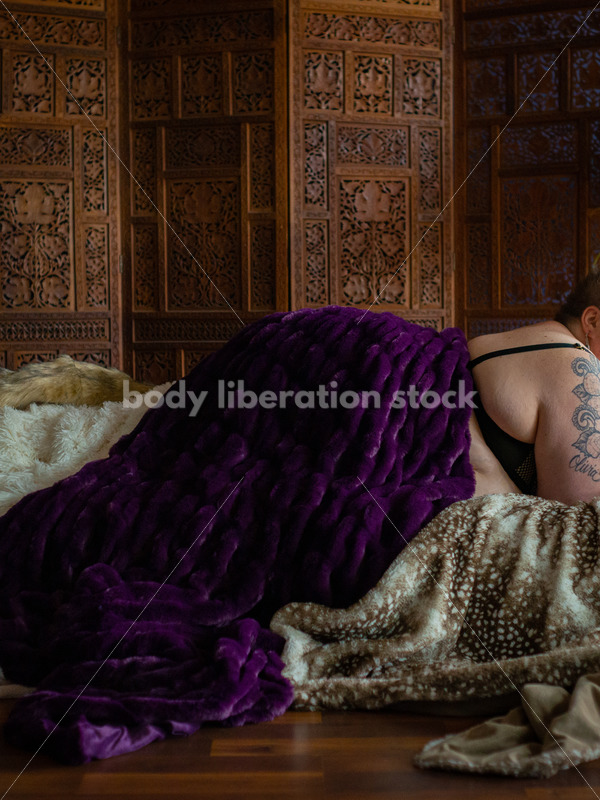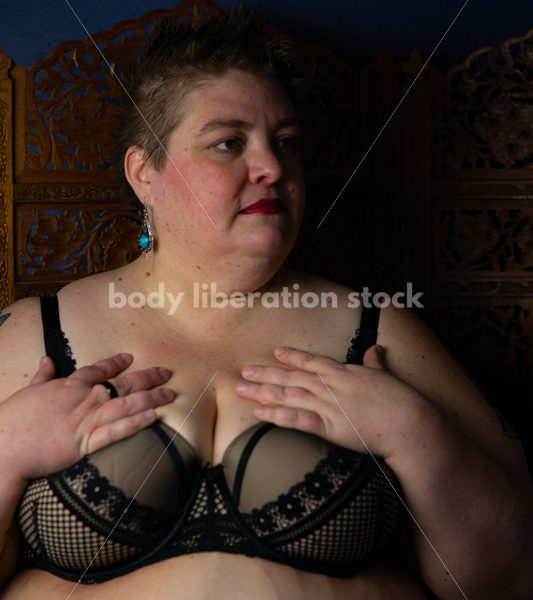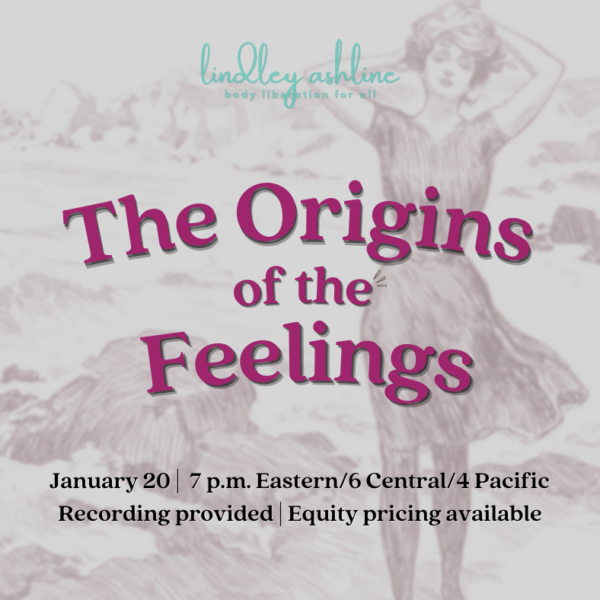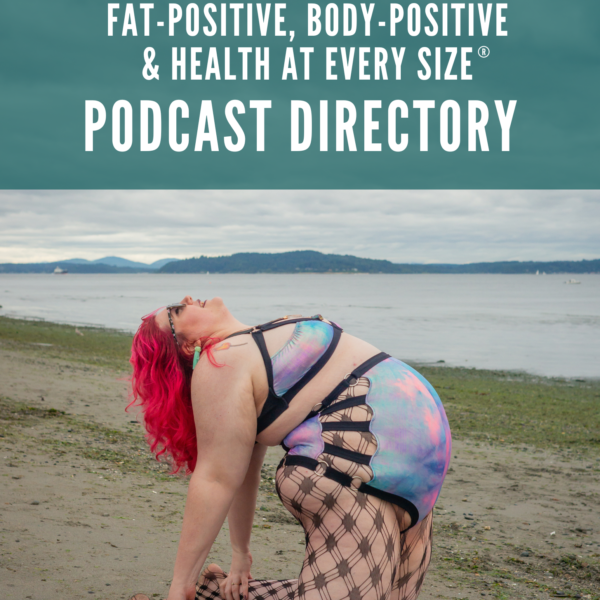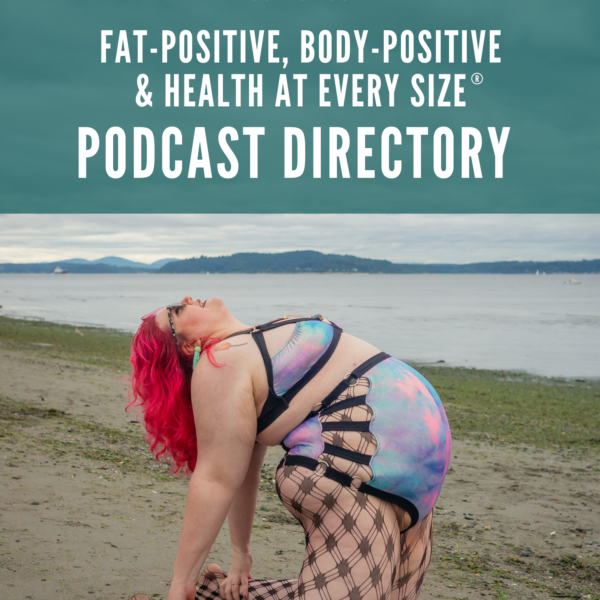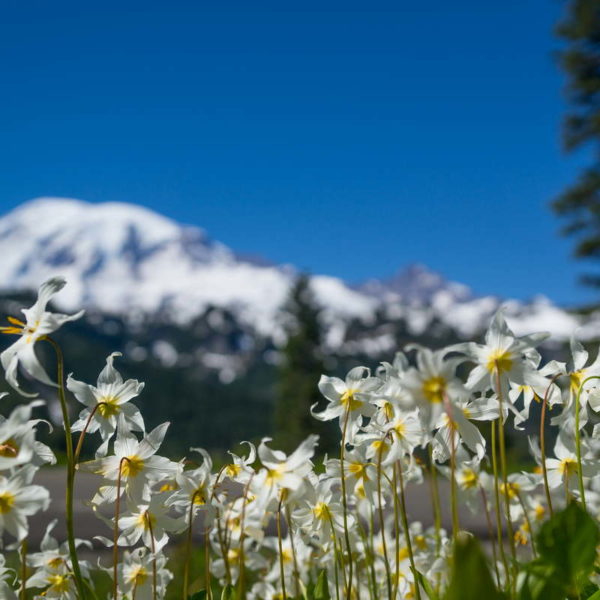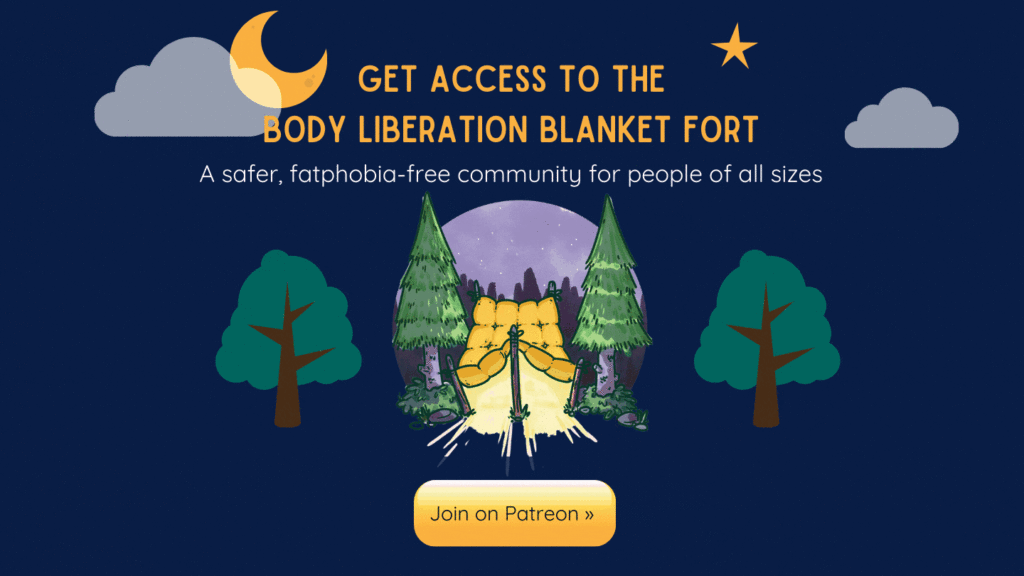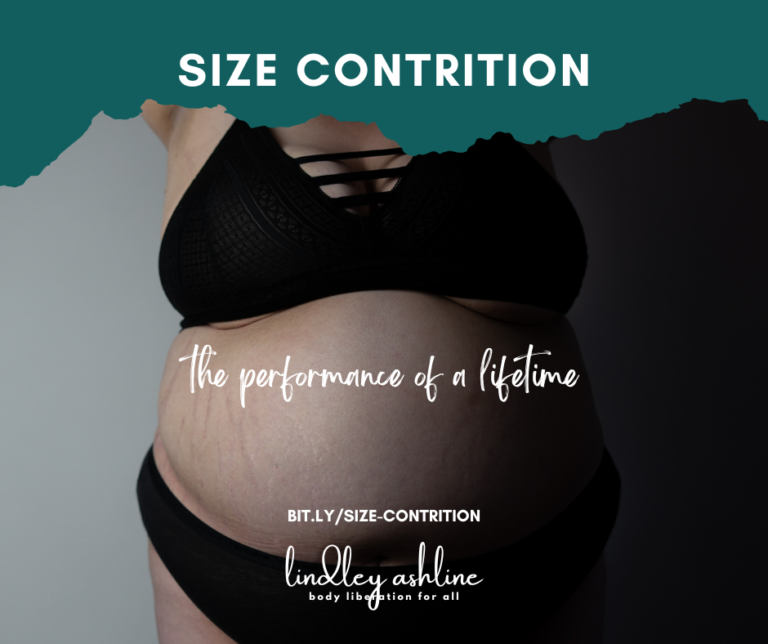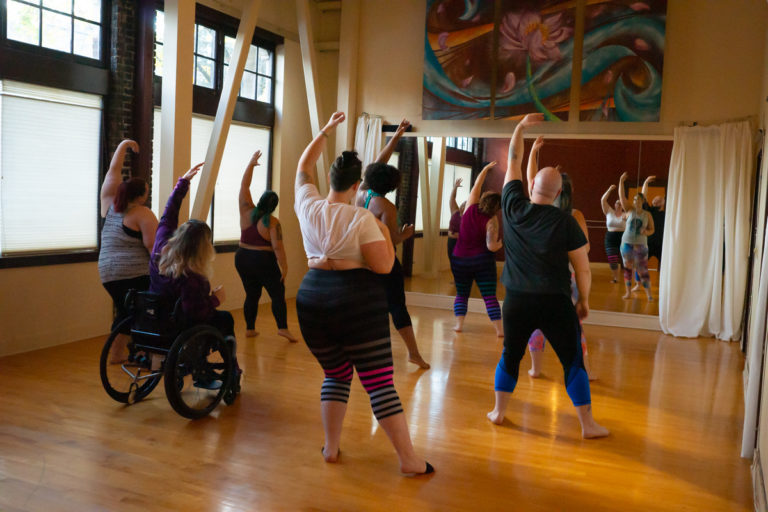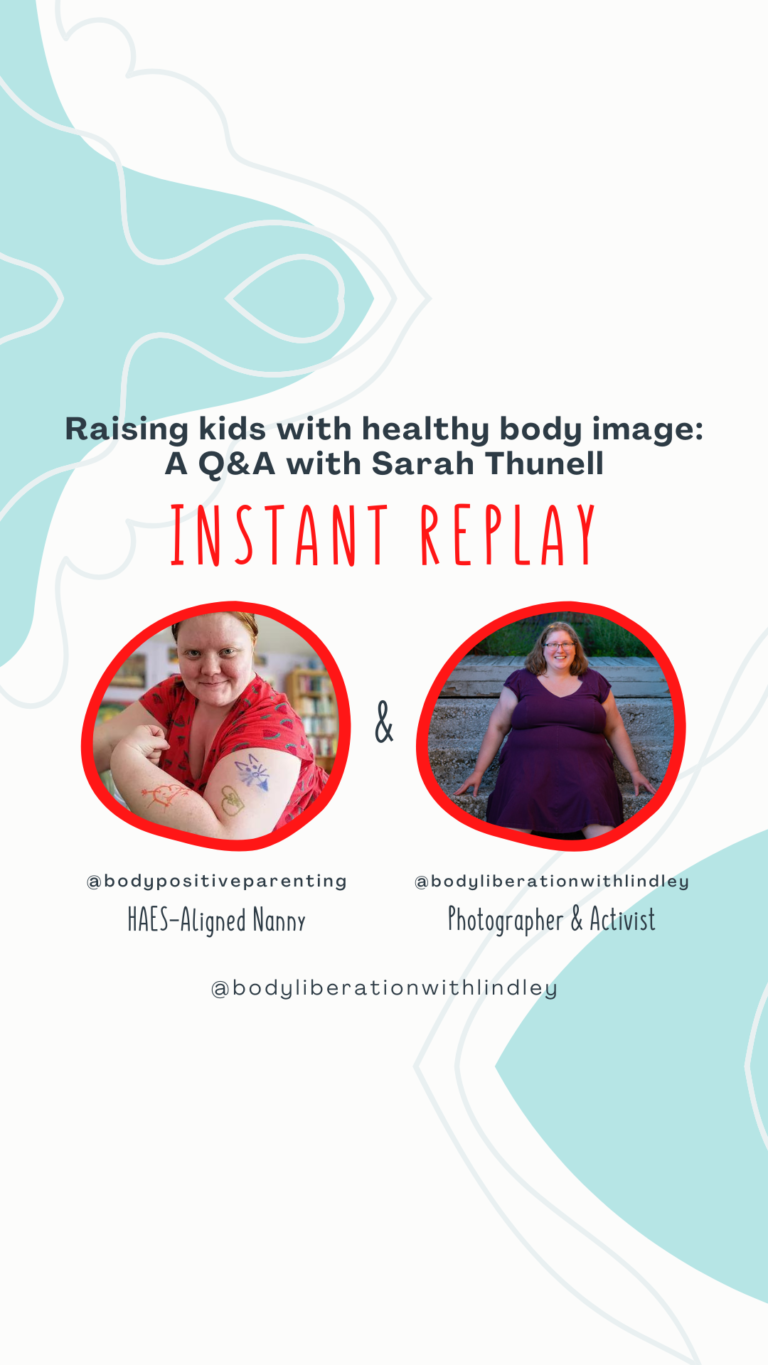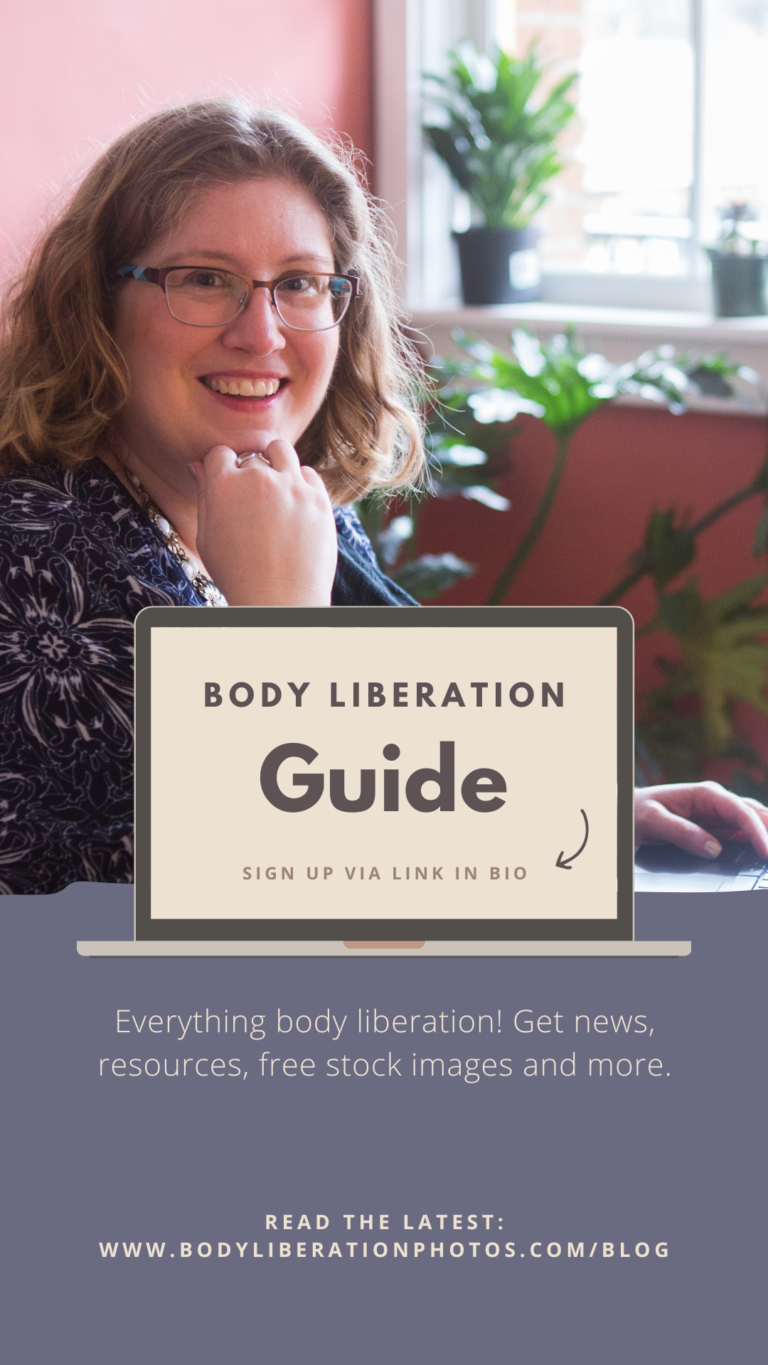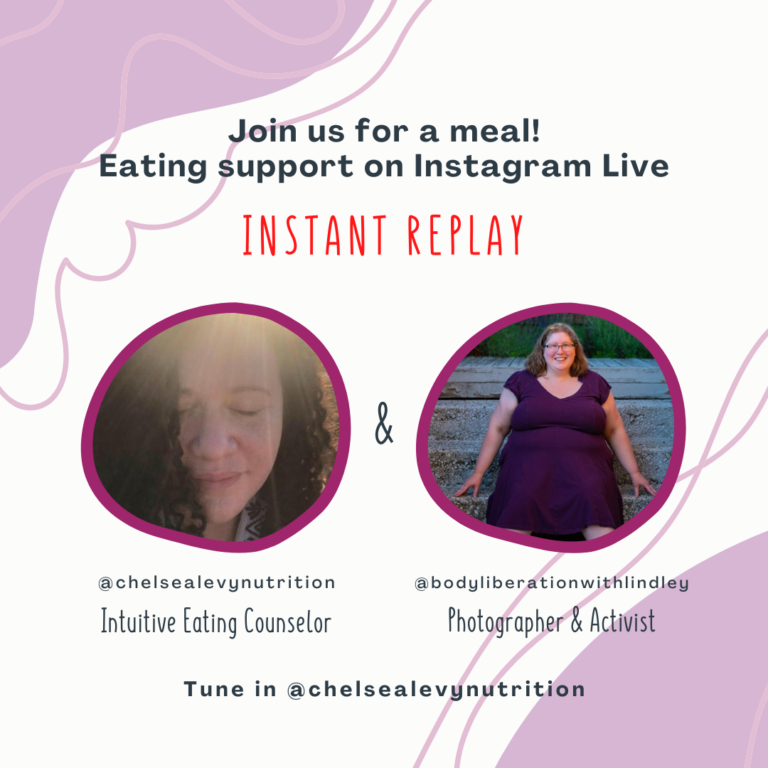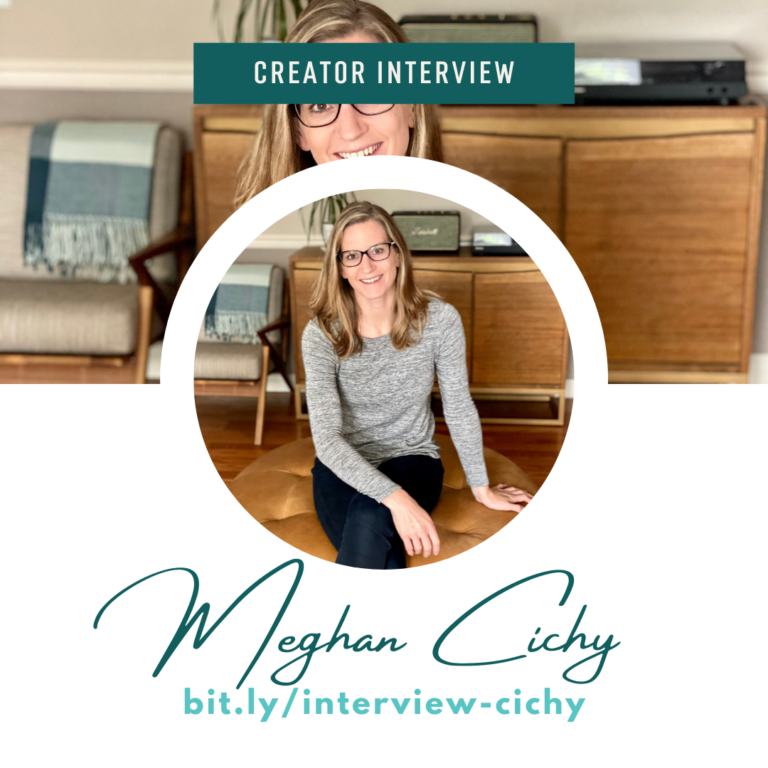Listen: Lindley with Amy Rapone on the RadLove Radio Podcast
New podcast drop! I had the chance to talk with Health at Every Size®-aligned and fat-positive nutritionist Amy Rapone on her podcast RadLove Radio.
In this episode, we talk about:
- How I became a photographer despite never having seen anyone like me doing photography
- Susan Boyle and talking dogs
- Who finds career opportunities from 15 minutes of fame
- What it means to be a marginalized leader in your field
- How representation opens our hearts and minds to what we can be
Amy has set up the coolest way to compensate podcast guests, so check that out for sure while you listen to our convo about body liberation.
Episode Transcript
Amy Rapone: Hello there, I’m Amy Rapone, your host and trusted tour guide toward body liberation. I’m an anti-diet dietitian who helps my clients find nourishing ways to live their lives, and a mom who’s hoping she’s not messing her kids up too much. I hope you’ll join me in conversations with my guests about building on unapologetic joy, liberating fat bodies and bringing diet culture to its knees. Welcome to RadLove Radio.
You are listening to Episode Four, featuring the lovely and fabulous Lindley Ashline, writer, photographer, body liberation advocate and activist and I will be honest that I fangirled a little bit during this episode because I have been following Lindley for a very long time, or at least it feels like to me now. And so being able to talk to her was an absolute pleasure. I’m so excited that y’all are here, I hope that you’ve listened to some of the other past episodes. If not, feel free to go listen to the other three later on today if you’d like.
Also, if you are a lover of the RadLove Radio podcast, head on over to our Patreon page, I will have the link down below in the show notes, so that you can help me support my guests. That’s what I would like to do help them receive funds for their time, energy, expertise. They give so much by coming on here and I appreciate it so much. So I would like to be able to pass that along. Unfortunately, can’t do that on my own yet. So I’m giving out some perks. And what I am able to do if you head on over to Patrion, you can see all the fun goodies that you can receive, bring me support our guests.
And before, we jump in a few updates on what’s going on with RadLove. So over at RadLove Nutrition. I am currently taking on one to one clients, both for nutrition counselling and body image coaching. So if that’s something that you are interested in, I will have the link down in the show notes for you to check that out. And also keep an eye out for small group body image intensive group that I’ll be putting out there in January. I can’t wait to put this out here. It’s kind of been a labour of love, that I’ve been building on now for the last year or so. And that is called Defy Discomfort. So many of my clients come to me telling me that they are over diets, they’re over intentional weight loss. They are just ready to move on with their lives, but they still feel this discomfort being in their bodies. And so that’s what this Defy Discomfort was made for, was to help us pinpoint where those discomforts lie and how we can start to move past them. And so I can’t wait to share that with you. If you would like more information on that program that’s going to be upcoming. There is a waitlist, email list down below also in the show notes that you can jump in on so that you can find out more information as it gets released. And with that being said, Here is my interview with Lindley Ashline, hope you enjoy.
All right, well, welcome so much to our guest today. Lindley, Would you like to take a moment to introduce yourself to everyone?
Lindley Ashline: Yeah, thanks for having me. My name is Lindley Ashline. And you can pronounce the D or not.
Amy Rapone: Okay, good to know.
New at Body Liberation Stock
Lindley Ashline: I grew up southern so I don’t pronounce the D. But occasionally people get kind of wrapped up in chubby pronouncing the D. Lindley is fun. I am a photographer, writer, and body acceptance activist and I live outside Seattle, Washington. I do have my fingers in a number of different pies, a lot of different things. But it all sort of comes back to fat acceptance, body liberation. And I do want to clarify for this episode that when I use the word fat, which I do a lot, I’m using it as a neutral descriptor of bodies, in the same way that I might say someone is tall or has brown hair. I’m not using that as an insult or a negative thing. And so I do client photography, boudoir and portrait sessions, small business sessions, I do stock photography, I do some Health at Every Size consulting, I do a lot of writing. And I also have the Body Love Shop, which is my curated, fat friendly store with artwork and high weight limit furniture. And it’s sort of a one stop shop for body acceptance, goods and artwork.
Amy Rapone: And I appreciate that. I’ve dug through that body shop a lot. And I love it so much. I’ve been following your work for quite a while now. Maybe not as long as you’ve maybe been doing the work for but certainly since I found you, I was on board.
So I’m so excited to have you here. It’s a huge pleasure. And so to kind of start off our conversation, I’m going to ask you the question that I kind of ask everybody here and what does body liberation mean to you?
Lindley Ashline: Now, when Amy and I were talking right before we started recording this episode, I said, Oh, give me a minute, I need to think about this. Because otherwise, it’s gonna be a really long rambling answer. That doesn’t mean anything, but, I sat down for a second, thought about it. And my answer of what body liberation is? It’s tearing down the systems that elevate the worth of some bodies above others. So it’s beyond just feeling good about your body or being happy with your body or accepting your body. The liberation part is about the systems. So it is it is very much a political stance, and a system wide stance, and not just a personal one. Because when all bodies are equally free to participate in public life, public infrastructure, health care, employment, all these different things where some bodies are valued more than others, when we’re all equally free to participate in, that is what liberation means. And so it’s a political stance and a stance about power. But it comes back to our individual bodies, to free our bodies, to participate in the ways that that more highly valued bodies are ready to get to participate.
Amy Rapone: Yeah, I think that’s a word that’s really come up a lot. And a lot of people’s responses so far is that freedom aspect of everything, where it really is, you know, we see those things that we don’t have access to as, fat people. And it’s, it’s really integrating that freedom part where we can do some of the work for ourselves, but it’s hard to do that work until these, things in our society change along the way. And so kind of some of those things are work that you do in media representation, and, you know, having the stock footage that you have purchased from, and very happy to have access to, in being able to see people in different body shapes than we would typically see, in social media or media in general. Without, you know, we might see, you know, people in fat bodies for like a diabetes medication ad, or these things where we kind of note that this isn’t the body that you want to be in, it’s more of a negative tone more than people just celebrating their lives. Why do you feel like representation is so important to fat liberation?
Lindley Ashline: Well, representation is so important because, I have the numbers for this, we have studies on this, I can’t quote them off the top of my head, we can put them in the show notes. But we know from you know, actual real science, that what people see affects how they see themselves and what they think is possible for them. So if the only time we ever see fat bodies in the media is in a negative context, that is teaching all of us, people in all different kinds of bodies, how to feel about fat bodies, but not only that, it’s when we don’t see fat bodies represented positively. We don’t think we can do that. Um, and this is certainly not limited to fat folks. Um, you know, when we don’t see black people in positions of authority, um, we are less likely to consider black folks authoritative and so on. And this applies to every marginalized group, not just that, folks. but fat people is my lane. I just want to be clear, not unique. Um, so when we, don’t see fat people, when I started doing photography professionally, I spent about 10 years really wanting to, but I’d never seen a fat photographer ever. I’d never heard of one. And that is changing rapidly, which is great. I know lots of fat photographers now, who were doing wonderful work. But when I started Looking at photography as a business, as opposed to just a hobby, um, when I started thinking about photographing people, um, because I started out in nature photography, which I still enjoy very much. But when I started thinking about photographing people, of course, the obvious avenue to take his wedding photography, And I just really struggled with this concept of being, you know, a fat photographer, because like, who’s gonna want to work? Are people going to want to fat photographer at their wedding? Are people going to want to work with a fat photographer? I had never seen one, And of course, from an academic standpoint, or like, you know, from a mental standpoint, yes, of course, it’s possible. But, I’ve never seen one.
And so I had to fight that, um, you know, am I going to be the only fat person at your wedding? And then I ended up choosing not to do wedding photography, after all, but I think that’s fair. But that was sort of the obvious place to start. So you know, when we don’t see fat people, as political leaders, when we don’t see fat people, as academics, when we don’t see fat people, as CEOs, all these different things. It shows us that is not at a subconscious level, we absorb that, that is not where we belong, right. And so, the representation again, not just that, folks, but the representation of every possible kind of human being is so important, because at a subconscious level, it tells us where we belong, what is possible for us. And so, it like, we never see fat kids in the media, unless they’re punchlines, or cautionary tales, or, you know, fat people, are before pictures. We’re the ones Yeah, we end up in, we only get represented in like the diabetes ads, and like the headless fatty on the news, who’s walking down the street with in their head is cut off in the video role. And they’re, holding a giant soda. Yeah, you know, what I’m talking about, like, when we are only shown in this negative context, we internalize that, we have the science on body image, we know that this happens.
New in the Body Love Shop
Amy Rapone: Yeah, I think too, you know, when you bring up the not seeing fat photographers, and not knowing if you’d be able to do that, I wonder how many people in so many different professions? Because I know, I felt that way. As a dietitian, you know, we, there’s not very many of us out there. And certainly none in my class, none that I had ever met or seen. I know, I wonder, you know, what professions people really think of that? When would I be a fat person? As a lawyer or as any of those kinds of professions? Where maybe I can’t do it because of that, because that automatically puts that little ear worm in to know that maybe somebody that’s second guessing maybe because I’m in a fat body? I can’t do this, when of course we can.
Lindley Ashline: Yeah, I mean, and when the representation is non existent, or very rare. What often ends up happening is when there is an example of that representation, on one hand, that person is treated so badly, they may or may not last very long in that role, true. Um, but it’s also becomes the like, what I started calling the talking dog phenomenon, where they become, they’re not respected for what they do because they’re fat. And my favourite example of this is Susan Boyle. You remember, she was very famous for a hot second. I don’t even know how long ago now, because she had this amazing singing voice. And if you watch the original episodes of whichever talent show she was on, I don’t do a lot of.
Amy Rapone: I think it was British version of talent or something. Something like that.
Lindley Ashline: So when you watch those clips from those original episodes, it’s very much this talking dog phenomenon, like they are so astonished, Not that this human being has a beautiful voice, that they weren’t blown away by her voice. They were blown away that a fat person had a voice, and it’s so condescending, and it’s so I get really infuriated when I’m talking about this because of course fat people can be amazing singers. Of course, they can be amazing dancers, of course, they can be lawyers. But when we only see that one sample, it’s like there’s all this condescension and nonsense that surrounds that where they can’t just Susan Boyle wasn’t able to just be a human with a wonderful voice. She had to be like, the clown. She had to be like, people were like, Oh, your voice is so great, but nobody took her seriously.
Amy Rapone: Yeah, and all of the media coverage and headlines that she had after the fact. You know, there was always a but involved, right? Like, she has a beautiful voice, but and then they would always make cracks about the way that she looked or her body or any of those things. Which imagined being such a contradiction to be celebrated in such a way, but then also tore down at the same time. It’s intense, I can’t imagine.
Lindley Ashline: Yeah, it is intense. And, you know, and it sucks to be that path breaker, it sucks to be the leader in your field, it being in a marginalized body because people are so astonished that you have any skill or value whatsoever, because of that, right? Like, I get really riled up about that.
Amy Rapone: I get that.
Lindley Ashline: It’s just infuriating to see people treated like that. Because when you think about the amount of short term fame and notoriety that she had, and she did produce an album, but a person in a more socially approved body who had that level of fame, even short term, would have had a kazillion career opportunity. Yeah, I mean, that would have been a huge entry point for them. And, I mean, I don’t know what she’s doing these days. I haven’t looked her up recently. But you know, either you heard about her at the time, or you have no idea who she is. Right?
Amy Rapone: Right, I think you are very right.
Lindley Ashline: All those career opportunities were not open to her.
Amy Rapone: And that kind of brings, I think, into the posts that you had put out on September 1st about fat people off, oftentimes being like, the fool or the villain or greedy in a lot of our media, especially in our written media, but certainly taking on the role of the fool as Susan Boyle did and like, being this extraordinary character of herself, that perpetuated the media for a really long time in such a negative way outside of this beautiful gift that she had. And I think that continues to really tear people down and how we are never seen as the good guy. We’re never seen as somebody who is going to contribute to society in a positive way that we could ever do anything and how suppressing with the amount of ideas that all people including fat people have that you know, where could we be? Where could we be with that?
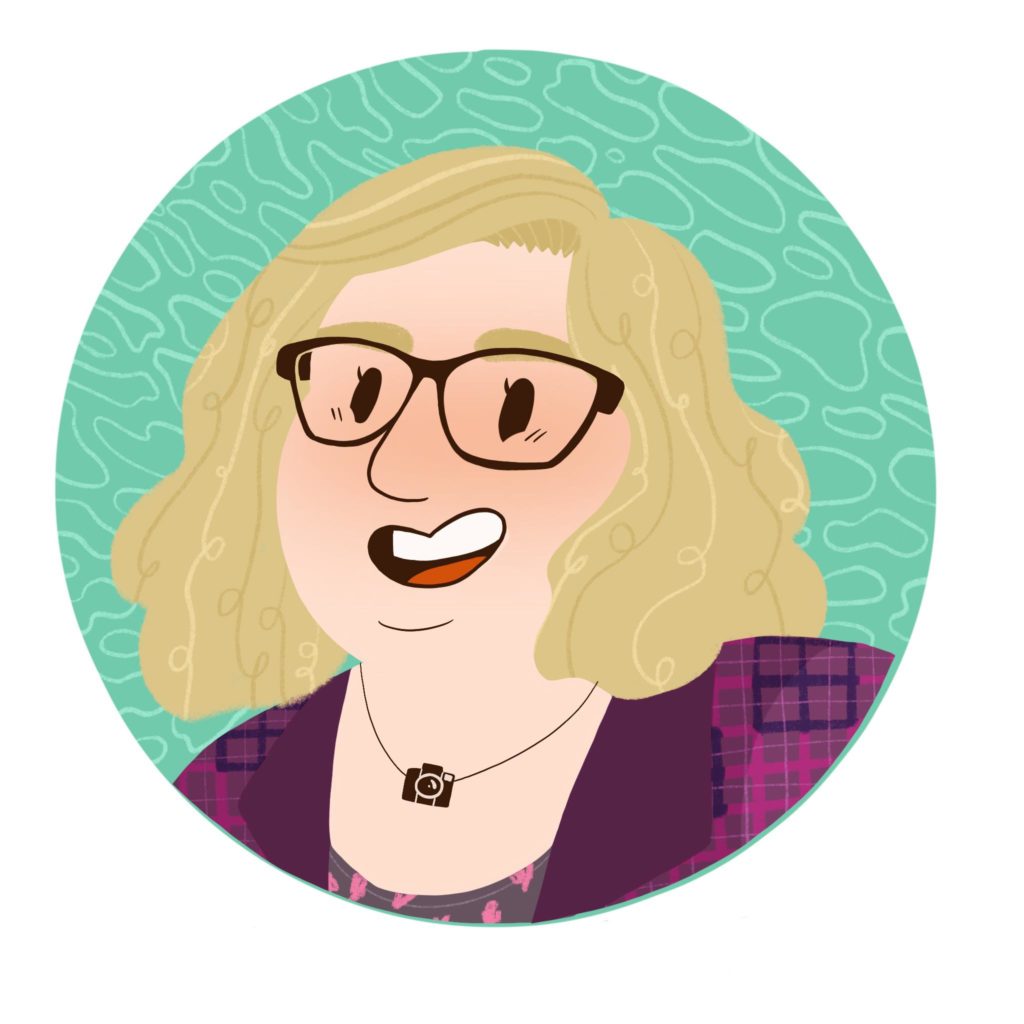
Every Monday, I send out my Body Liberation Guide, a thoughtful email jam-packed with resources on body liberation, weight stigma, body image and more. And it’s free. Let’s change the world together. Subscribe »
Lindley Ashline: Yeah, I mean on the whole what kind of scientific breakthroughs are we missing? Because the mind that could have made that breakthrough couldn’t fit in the desk in grad school. What kind of voices are we missing? Because nobody would allow, to make it through auditions. What Supreme Court justice are we missing? What President did we miss? You know, what cure for cancer did we miss to use the cliche because fat people are only allowed that to occupy so many roles. And all of those roles are either negative, or they are supporting roles. We are either and again this crosses with race in some really important ways. Yes, lately I want to acknowledge that um, you know, if you’re interested look up the fat black mammy stereotype. This is absolutely a place where really overlaps but we are allowed to have villain roles. We’re allowed to have the sloppy fat husband roles, We’re allowed to have the Melissa McCarthy sidekick roles. We’re the clown. We’re funny. We’re allowed to have like the jolly secondary character roles. We’re allowed to be sad.
Amy Rapone: We’re expected to be sad.
Lindley Ashline: Yeah. like we’re you know, we can be the tertiary character shoving the cake in their face in the background and crying into their ice cream. You know? but we don’t get to be the princess. We don’t get to be the star, we don’t get to be the genius, who comes in and saves the day. We don’t get to be the action hero. We might get to be the action heroes ridiculous sidekick. You know one of my privately favourite sayings is fat girls gets to be princesses too. You know, we get to be glamorous and elegant and things but we’re not. We’re not allowed. Um, even though we are inherently, all of those wonderful things, but we are not represented in those things.
Amy Rapone: Absolutely. And that again, we may grow up wanting to be those things and are smashed from the get go to say that this is not an option for you. You get to be my maid of honour, or you get to be the flower girl or whatever in the dress up, you know, you don’t get to be the bride, or, you know, we never get to really flourish from there. And I think that goes into a lot with fat people in dating too, where we think of where people aren’t going to be able to how could they possibly love us? And, you know, it just brings us down too much. When it comes to what can be done in trying to move forward. Where do you see that going in? Do you see any positive change?
Lindley Ashline: Yeah, I do. I think, you know, if you look at my social media, I do have some, bones to pick with the body positivity movement, and the way that it has taken the work in the progress made by fat activists, and used it to, so that the people that are in very normative bodies can centre themselves and profit from it. And that’s a different story. But, I do think that the body positivity movement that mainstreaming has made it accessible and present for a lot of people who would not otherwise have been exposed to the concept of body acceptance, I do see the Health at Every Size, movement is gaining in awareness, you know, people are more aware of that, I do think the world is changing, it’s changing far too slowly to suit me. That’s why I started being an activist because it wasn’t changing enough. And I started pushing, you can’t see me on this recording, but I’m making these gestures, And I think that, you know, there are big ways that things can change and small ways, and all of those things are changes. And I spend a lot of time talking about my privilege of being able to be, you know, I run my own business full time, although I do have some part time corporate work. And but, I spend most of my time running my own business, I’m not accountable to an employer where I might get fired for speaking out loud, I don’t have kids. So I have my time is mostly my own, my schedule is mostly my own. The consequences of the words that I say, of course, there can be consequences, but generally, they’re not career consequences, Um, you know, I have a huge amount of real privilege and a huge amount of freedom in my ability to speak, which allows me to be radical in a way that I would not be able to be if I had an office job, and, you know, kids who needed to be able to fit in, their social circles or whatever, so I’m always very careful to say that, you know, again, I have all these privileges to speak, and to be more of a capital A activist, but anybody can push the needle, whether it’s just not participating in diet, talk at the office, or it’s, making sure that your kids aren’t hearing you talk negatively about your body or other people’s bodies, you know, there’s so many things that you can do, that literally will change the world. And I come back to kids a lot, even though I’m not a parent, because, you know, that’s the next generation coming up. And what you do as a parent, or relative, or a teacher, or any kind of person who spends any time around kids, the way you interact with your body in their bodies. Like that is incredibly important. Um, but some of the ways that we can change that, that come back a little bit to photography too, or this is why I do the stock photography. Because it’s another way that we are directly changing the world.
So, when people are using more diverse stock photos, if you don’t know what stock photos are to just to circle back to that stock photos are the photos that people and illustrations that people use for their marketing, so unless you are a Coca Cola, or Microsoft, if you’re a company, you probably don’t have the budget or the authority to hire a photographer every time you need a whole shoot. So you’re using stock photos. If you’ve heard of Getty Images, they also do like the red carpet, paparazzi type photos. Um, Getty Images is one of the big old school stock photo agencies. There’s also istock photo and dream stock and there are 1000 stock photo sites on the Internet. And 99.999% of the human body is depicted in those images that these mainstream stock photo sites have are thin. Particularly people who are in Very large bodies are just not represented at all. Because photographers are hiring models to be in stock photos. And that’s why you see these photos on billboards of like, I don’t know, a doctor who is like impossibly pretty Yeah, I mean, obviously that is a human with a perfectly valid body too, I guarantee you that person is a model who has also been photoshopped or you see the stock photo of the conference room there’s three white men and Asian woman, a black man.
Amy Rapone: All standing around that conference table like
Lindley Ashline: With the window behind them.
Amy Rapone: Yep. Lucky if there’s a plant in there or something, but that’s about it.
Lindley Ashline: Yeah. That’s one of my favourite stock photo genres. Smiling women laughing alone with salad.
Amy Rapone: Oh, Yeah. When you ever Google like stock photos of dietitians, it’s wild. We’re holding all kinds of weird food. White ladies holding all kinds of weird food with their white lab coats on sometimes they have stethoscopes, I don’t know why, because we don’t do that. I’m just like, Okay, great.
Lindley Ashline: Because of the photographer in question, who took that photo? Not well, stethoscopes or medical related here, hold?
Amy Rapone: Sure. Yeah, I got one of these.
Lindley Ashline: So that is, and stock photos are. I’m wondering a little afield here, but it’s important too, if we’re going to talk about stock photos, are both prescriptive and descriptive. They are descriptive, and that photographers are photographing things they think will sell, right. So their images are describing the way our society exists. But they are also prescriptive in that it’s perpetuating that there’s only one type of photo that’s being produced. And that continues to cement that these are the people who do things, right. These are the images of people that are represented. And so what I’m doing is, I’m prescribing something different. I’m saying there are more bodies out there than 22 year old, semi professional models, who are modelling for photographers who value one type of body. You know, I’m photographing very fat people. I’m the only one in the world doing this. And it’s really cool, because I’m changing the world and unique way. Um, but when we use more diverse stock photography, it’s so cool, because we’re gonna attract new business, because we’re representing our actual customers. You know, because I don’t know anybody, except maybe unless you’re a model agency, in which case, they’re stalking your clients. But I don’t know anybody whose clients or customers are solely 22 year old models.
Amy Rapone: Yeah. Generally, 22 year old don’t have a whole lot of money.
Lindley Ashline: Yeah, so I mean, everybody, who runs a business is serving all different kinds of types of people in general, you know, So representing that means that you’re making way more people feel welcome. Especially say if you run a gym, and you want to show that you are friendly towards all different types of people. But if you’re only showing 22 year old models and fitness gear on your website, well, that’s welcome.
Amy Rapone: Right. And that perpetuates this stigma of us not belonging in the gym anyway, which we hear from so many people when we actually get there.
Lindley Ashline: Yeah, And now you had to back that up, too. You can’t just use diverse photography, images, and then be really crappy to the people. You know, yeah. To the people that look more like those images when they get there. But that’s a whole different discussion. But that is just, it’s really cool. How much you can subtly change the world by just using a different photo.
Amy Rapone: Yeah, absolutely.
Lindley Ashline: So of course, I have a vested interest in that, you know, but that is, it’s a really easy way to do good things for your business and the world at the same time.
Amy Rapone: And they’re lovely to look through. I’ve taken a lot of time when I was selecting some for my own website, that’ll be coming up my website, but I’m kind of tweaking it a little bit. And looking through those and just, it’s a beautiful thing to see. And I’m so grateful for you doing that work. It’s lovely.
Lindley Ashline: People use those galleries as exposure therapy all the time. And that’s lovely idea, because we’re also you’re going to find, you know that I mean, there are places on the internet where you can find lots of beautiful photos of larger bodies, people’s Instagram feeds and so on. But it’s a really great place to just find 1000s of images just to scroll through and be like, Oh, look at that body. That body is great. Look That body, that body is great. Oh, that’s what it looks like mine. Yes, in a way that’s respectful and beautiful at a high quality. You know, and just Yeah, so people will just go browse.
Amy Rapone: Yeah, I love that. I love that so much. And I think that you could, because I am a mom going back to, you know, having exposure, anybody who has exposure to children and really changing that narrative just within your own home or in the communications that you have with children or not even communication, because so much of it is body language and environment that you create for a child around you, is so much harder than I ever imagined it to be, you know, and I’ve done this work now for a bit and feel comfortable talking to myself, about myself without an issue. But when it comes to her changing body, and the language that comes along with that, and because she’s probably going to be, you know, she’s got the genes of the rest of us fat ladies in this home. And so she’s, you know, like she had even just six years old, trying to get a belt that fit her and the belt didn’t fit around her. And I was just heartbreaking. And I’m like, I’m going to the store and buy a new belt, because that one not made right, and just kind of finding those words to say when we come across that because we know it starts so young, when we’re exposed to that, and I think that’s a really important part in those action steps to watch what you’re saying to them too, and not just around you. And you know, the way that you speak around their bodies. And It’s hard, but so rewarding. At the same time. I mean, we’ll see that she gets older, and we’ll see where it goes. You know, we sometimes only have so much influence depending on how the world treats her. But it’s incredible.
New at Body Liberation Stock
Lindley Ashline: I think it’s easy for parents who are body accepting or body positive in themselves to put a lot of pressure on themselves to produce kids who are totally body accepting and that’s a great goal. But it’s hard. for two reasons, well, three, because parenting is hard in general, you are taking care of somebody else’s life and shaping that, that’s a tremendous responsibility. So that’s number one. Number two is that no matter what messages you give them, um, the world is going to give them the predominant messages that it does about bodies. So you can fight the good fight. but also they’re going to be getting negative messages from everywhere else. So you know, you just cannot put the pressure on yourself to totally outweigh the messages, the rest of the world is getting them. You just can’t I mean, you can you do what you can. Because you are breaking general, generational cycles yourself. That is hard work. That requires you if you are changing the way you think about your own body, and the way that you are communicating to kids about bodies in general, that’s two things, two big, important heavy things that you’re juggling at once, you are not going to do a perfect job. And you have to give yourself grace about that. Yeah, because breaking those generational cycles of body hatred, it’s hard work. And it may take you your whole life, it may be something that you’re just always working on. And that is totally normal. That is not you being a failure, or being too slow about it or just not being magically bought anything. It takes most people you know, a very long time. And it’s never really because we’re surrounded by the world that gives us the messages that it does. There’s never really a place where you have reached, I don’t know, body nirvana and you’ll never be our bodies again. Like that’s just not that’s not realistic.
Amy Rapone: That’s not that realistic. Yeah. And another good reason to making sure that the images that they are taking in, are diverse in that way as well. So however way you can, the best possible way that you can control that and whatever controlling that looks like that’s such a, that’s a big one to grapple with. But I apologize, I interrupted you there.
Lindley Ashline: Oh, no, I was just gonna say yeah, the more that you can provide for them. Yeah, And of course, if you are helping provide them good body images. You’re also reinforcing that yourself. Yeah. But just give yourself a lot of grace because you’re doing hard. Important work. Yeah. Not going to be perfect.
Amy Rapone: Yeah. Well, I thank you so much for coming on with me today. I really appreciate it. I really enjoy you and your voice and everything. that you are able to represent in this movement, and I’m so grateful for your work. How can people find you and reach out to you or whatever they might want to do if they want to work with you? Or just follow you and see your awesome stuff?
Lindley Ashline: Yeah, please do feel free to follow me. Yes. So, you can find all of my work at body liberation photos.com I’m most active on my Instagram, which is @BodyLiberationwithLindley and I’m sure will end up in the show notes. I also do a weekly newsletter, that is to toot my own horn a little bit, it’s really fantastic. It really is. It has some kind of meaningful writing every week, about body image or systems of power or body oppression or, you know, body how to love your body more or, some kind of relevant writing every week, plus things that are sort of hot topics right now in the realms of fat activism or Health at Every Size or body positivity. And you can get to that at bit.ly/body liberation guide.
Amy Rapone: Yeah, awesome. And that’s been a lovely thing to have show up in my inbox every week. I really, enjoy that.
Lindley Ashline: It’s something I’m really proud of. Yeah, because it makes such a difference for people.
Amy Rapone: Wonderful. Well, thank you so much, again, for being here. And I am so excited to continue to see where your work grows. And I appreciate you taking the time.
Lindley Ashline: Yeah, thanks so much for having me.
Amy Rapone: What a wonderful episode, I am so incredibly grateful to be able to have spoken with Lindley and to have that conversation. Again, a bit of a fan girl. So it was a very exciting conversation. And I will make sure that all of her information so that you can access her work is down below in the show notes. The other thing I want to make sure you all are aware of that Lindley just kind of released after we recorded is the body liberation blanket for discord group. So if you go on over to her Patrion starts as little as $1 a month, you will have access to this 24/7 chat space. There’s so many perks and awesome things. And so I think it’s a really exciting way to build up community. So if that’s something that you’re interested in looking for fat, positive, body safe community of people to just kind of talk through with, this seems like a really great group. So definitely check that out. As a reminder, this episode is for educational and entertainment purposes only. This is not a replacement for mental health or medical advice. Thank you all so much again, I can’t wait to chat with you all in the future. Let me know if you love this episode, head on over to on Apple podcasts. If you want to leave a review. Definitely subscribe, so that we know that you’re listening and that we know that you’re following and that you’re loving what you’re getting. Have a wonderful rest of November and I will see you in December.

Every Monday, I send out my Body Liberation Guide, a thoughtful email jam-packed with resources on body liberation, weight stigma, body image and more. And it’s free. Let’s change the world together. Subscribe »
Hi there! I'm Lindley. I create artwork that celebrates the unique beauty of bodies that fall outside conventional "beauty" standards at Body Liberation Photography. I'm also the creator of Body Liberation Stock and the Body Love Shop, a curated central resource for body-friendly artwork and products. Find all my work here at bodyliberationphotos.com.

